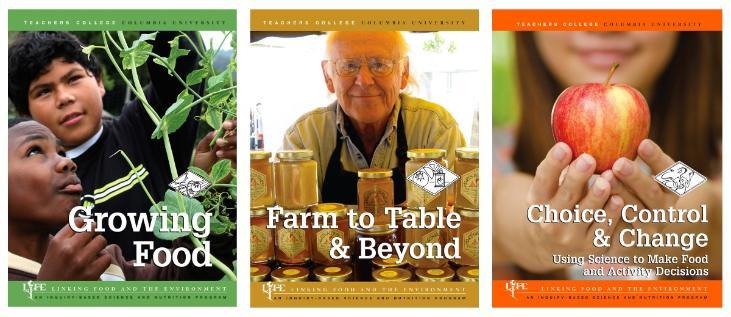Engage children in exploring food systems, food choice, and personal health!
These curricula address the interplay of biology, personal behavior, and the present food system. Our lessons and materials provide educators with the knowledge, skills, and resources to teach effective food and nutrition education.
Our curricula is designed for a wide range of educators, such as:
- K–12 educators
- Pre-service teachers in undergraduate or graduate programs
- Educators (paid or volunteer) who conduct gardening, cooking and other food and nutrition education
Explore, download, and/or purchase our curricula and resources:
- Growing Food
- Farm to Table & Beyond
- Choice, Control & Change
- i2 Food Chemistry
- Food Day
- In Defense of Food
- Dance Breaks
Growing Food (Designed for grades 4, 5 & 6)
The module's driving question — How does nature provide us with food? — frames students' investigations as they learn about critical ideas in science: the cycling of matter and the flow of energy. Students engage in hands-on investigations of photosynthesis, explore food webs, discuss and debate managing agricultural systems, and more.
Farm to Table and Beyond (Designed for grades 5 & 6)
The module's driving question — What is the system that gets food from farm to table and how does this system affect the environment? — frames students' investigations of our complex and highly technological, global food system. Students develop an understanding of systems and examing the interacting parts of food systems. They engage in hands-on investigations of they cycling matter in nature and human impact on this cycle including energy and resource use in processing, packaging, and transporting food.
Choice, Control & Change (Designed for grades 6, 7 & 8)
The module's driving question — How can we use scientific evidence to help us make healthful food and activity choices? — frames students' investigations of how the human body works and how food and activity play a crucial role in its well-being — critical ideas in science. Students engage in hands-on investigations of "dynamic equilibrium" — energy intake and expenditure. They explore food preference, their food environment, lifestyle-related diseases, and more.
Growing Food, Farm to Table and Beyond, and Choice, Control & Change are part of the series Linking Food and the Environment (LiFE), which drive students to use scientific reasoning to analyze thier personal food choices and apply what they have learned as they make personal decisions related to food systems, health, and the natural environment.
Each teacher guide includes:
-
Lesson plans with helpful background information, practical teaching tips, and tools for assessment
-
Student activity sheets and reading
-
A matrix that maps each module to the National Science Education Standards and Benchmarks for Science Literacy
LiFe books are published by The National Gardening Association and available for purchase:
Purchase Growing Food
Purchase Farm to Table & Beyond
Purchase Choice, Control & Change
The development, evaluation, and dissemination of LiFE was funded by two National Institutes of Health Science Education Partnership Awards (SEPA). Additional funding for publication was provided from the W. K. Kellogg Foundation for the Rethinking Food, Health, and the Environment: Making Learning Connections, a joint project of the Center for Ecoliteracy and Teachers College, Columbia University.
i2 Camp - Food Chemistry
Need summer camp ideas? The i2 Food Chemistry curriculum helps campers discover:
- Connections between science and food in the context of our complex food system
- Challenging health and social issues we face
- How to advocate for food justice and support a more sustainable food system
Sample Lesson: "Hidden Ingredients"
Contact for the full curriculum: cu2155@tc.columbia.edu
Food Day
Food Day inspires Americans to change their diets for the better and to improve our food policies. Every October 24, thousands of events all around the country bring Americans together to celebrate and enjoy real food, and to take action to solve food-related problems in our communities at the local, state, and national level.
Each year, thousands of schools across the country participate in Food Day with a variety of activities including using the Food Day School Curriculum in the classroom, taste tests introducing children to new and healthy options, and health fairs.
Designed by the Tisch Food Center for upper elementary and middle school students, this curriculum offers five lessons to teach children the importance of eating real, fresh food, cutting back on processed foods, and advocating for a healthier community. The lessons can be easily adapted for older or younger students. We encourage you to teach the lessons in sequence on the week of October 24 in celebration of Food Day, but you can also use them individually and at any time.
In Defense of Food (designed for middle school & after school programs & is adaptable for ages 10-adulthood)
This curriculum, a companion to the PBS documentary In Defense of Food, uses activities and film clips to give young people new tools to think critically about food. Students prepare delicious recipes, create performance poetry and participate in peer-to-peer learning to investigate the question, “What should I eat to be healthy?” and discover what Michael Pollan means by his now-famous answer: Eat Food. Not Too Much. Mostly Plants.
Click below for an overview of the curriculum:
Access the full curriculum and related film clips for free online
In Defense of Food Full Curriculum
In Defense of Food is a project of Kikim Media, LLC. The centerpiece of the project is a two-hour PBS documentary. It also includes a web site (pbs.org/indefenseoffood), materials for organizing community screenings and house parties (including a shorter version of the documentary) and Spanish-language materials. Major funding for In Defense of Food was provided by the National Science Foundation and PBS.
Dance Breaks
The Tisch Food Center produces curricula independently and in collaboration with nonprofit food and nutrition education programs
